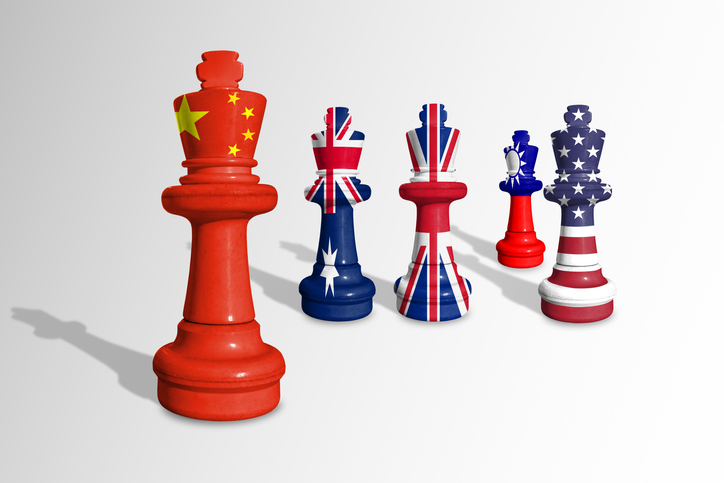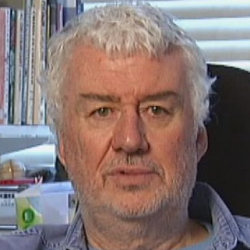Mimetic engulfment: The US has captured the Australian strategic mind
October 29, 2023
It is now the case that Australias alliance with the United States is best described as the Great Harmonisation. On all principal matters of strategic interest especially in all fundamental aspects of China as the pacing threat - the overwhelming impression is that, though Washington and Canberra are spatially separated, they nevertheless speak and act not only in parallel, but simultaneously, systematically and congruently so that a single, seamless narrative emanates.
Many herald this as an exemplary case of consensus ad idem a meeting of the minds which, in a perverse way it is, especially when its progenitors are identified.
That only threadbare reasons are on offer for the accusation against China, and covered in numerous postings on this site, is irrelevant in this context; its significance is derived from the fact the China Threat mindset reigns in the agencies of government and policy formulation and decision making.
Quite apart from official government pronouncements and policies, consider this: the generated responses from organisations in civil society to the AUKUS project from the main political parties, the Union movement, universities and other higher education providers, primary and secondary education sectors, and business are all in accord with it.
And why not? While some of them are bereft of the resources to understand China in the first place, the opportunities presented by AUKUS for pursuing their respective sectional interests are a balm for ignorance rather than a disqualification. This disposition denotes their capture. At the personal level.
The governments framing of the narrative has been very successful. The plural is essential to understanding the extent of the takeover because it has been a joint endeavour on the part of the governments of Australian and the United States.
Over time, and for reasons that require a disquisition on the intellectual-psychological architecture of the policy elites in Canberra (which is beyond the current focus and allowable length) the alliance with the US acquired a status somewhere between the metaphysical and the sacramental. It is thought to demand veneration.
As befitting of its status it was served in various ways, not the least being by regular and extensive exchanges of personnel to the point where US personnel were embedded, at highest levels, in the advisory, intelligence, and decision-making areas of the Australian government.
The intellectual, strategic, political, economic, and social traffic was, and remains, essentially one way. It is as preposterous to think that the hosting institutions in the US are interested in the insights that originate Down Under as it was for Oxford, Cambridge, LSE, and Chicago to care about the imperatives which faced the pre-independence and post-colonial states of Africa and Asia in the decades immediately following 1945.
For Australia, then, the evolution, so to speak, was from notional sovereignty to interoperability, to interchangeability, to integration, to assimilation what Kurt Campbell, President Bidens Indo-Pacific co-ordinator on the National Security Council, felt moved to describe as almost a melding which locks Australia in for the next 40 years.
Thus were created Paul Keatings Austral-Americans, those who conduct themselves as though Australia is some branch office of the United States or worse than that, its lickspittle.
As outlined, this situation is a travesty of national sovereignty and national security. On closer inspection, its worse than that because the remedial action required must overcome processes hidden in plain sight and that is a prospect almost impossible to realise without, minimally, Australia experiencing a revolution, or a national security catastrophe, or both.
In the social science literature which I am familiar with through attempts to understand the evolutions cited above, the processes are more properly understood as terminating in engulfment. And it is that which informs the pessimism.
[At this point I beg an indulgence: as this is a serious essay on a serious question, but not an academic paper, I have omitted sources and footnotes; I have, accordingly, also prcised various passages in the sources. To keep faith with the requirements of research integrity, I am, on request, willing to provide a schedule of both the sources cited and the full, peer-reviewed publications under my name.]
Thus . . . Fully described, engulfment is mimetic engulfment a concept describing the pre-rational structures of involuntary imitation of others. The argument is that the formation of identity of self occurs largely at an archaic level of engulfment in the moody background world of everyday experience, as follows:
Adults in their own groups typically do not realise the extent to which they are undeliberately modelling themselves upon others around them in the foreground and the background world. The typical condition of human identity is one of more or less compromised individuation whereby whole societies move together along lines of least resistance, because it is directly and dumbly felt that the world tilts in a certain direction.
Operationally, this results in individuals (intelligence analysts, economists, academics, policy-makers, decision-makers, advisers, and even those who have earned the accolade of leader) locating themselves, insistently, within a world which authorises both their place within a particular purified group, and the phobic exclusions of potentially polluting others.
By extension, critical distance is chimerical and empathy with the Other (a strategic adversary for example) is unlikely, perhaps impossible.
Furthermore, the intellectual character of the product - strategic thought and practise - will be just another manifestation of the interests of the dominant, authorising community.
Implied in such an approach, which not only embodies a theory about how the world works, is a warrant which authorises certain kinds of speaking, writing and analysing.
This warrant, it should be noted, includes both how, when, and what is to be spoken, written, acted, and analysed, and by whom.
It is, therefore, to be closely identified with the practice of The Rule found in monastic communities: as it produces and sustains truths, it defines the inter-relation between power and knowledge. By way of a defensive privilege , it mandates rules of exclusion.
Even then, it encompasses more than speech, text, and act; it is the very authorising order under which such disciplines and exercises are made possible, and institutions established.
Also by extension it is the material condition which enables and constrains the socially productive imagination, because it regulates the analysts forming of themselves according to the criteria of truths, or conditions of possibility, which the warrant allows.
No matter what is said or written, the inescapable truth is that the knowledge so produced is perspectival, and nothing more. This should not shock: as thinkers as ostensibly disparate as Albert Einstein, Alfred North Whitehead, William James, and Ignazio Silone have concluded, reality is always observed contingently by a man or woman of a certain region, a certain class, and a certain time.
In a special way consistent with the foregoing, strategic analysts and policy advisers are recognised and authorised within their purified group at the same time as they exclude those that would pollute them, namely, those not in communion with the approved version, or those whose interventions disrupt it.
Understood accurately and politically, these professionals are engaged, in nothing less than the making of reality in a way that produces and regulates knowledge, hierarchises that knowledge as it relates to its most basic categories, presents it as transparent, naturalised, and self-evident, generates and legitimates its own questions and leaves no place for anyone to stand outside of it.
In this sense the approved professionals, though obedient to The Rule, are closely akin to the pre-Culloden clans of Scotland: pre-eminently, intellectually impoverished and closed patriarchal, arrogantly superior in its self-estimation, offering little welcome to outsiders and speaking a language which only confirmed its unique identity. And it should always be remembered that the clan had basically no strategy only one battle tactic: the wild, front-on charge.
All of these are significant identifiers of the upholders of mainstream political-strategic analysis in the think tanks and the governments analytical agencies in general and the standard bearers of the AUKUS SSN and the China Threat in particular.
Where the occasional chilly draughts of criticism or unbelief ventilate this establishment and its dogma they serve only to drive its inhabitants ever closer towards its disciplinary centre of warmth; only there, within the orthodox consensus, can they celebrate their provincialism as truth, affirm the value of their profession to the world, and renegotiate their cognitive exclusiveness which can be acquired only through protracted training in a special field and access to information not available to ordinary citizens.
Their licence, then, is derived from the fact that they have the status of experts who can set a statesman right, pursuing a way of life which provides a livelihood through the practice of a skill valued by society.
But it also rests on a claim that, through the exercise of their chosen discipline which is supposedly external to them, they alone are capable of discovering and defining the singular reality of the world and that is a fraudulent claim because at its core is the absurd denial that they are engaged in interpretation.
For now, the situation is dire. No matter the logical and evidential bases of arguments against the current acceleration in to American engulfment, there is no appeal from the writ of the experts already engulfed. So long as their pronouncements are regarded as the embodiment of reason and rationality, the condition is inescapable because, to doubt it is to renounce the rational effectively to enter a plea of insanity.
Yeats, again, makes sense of it: We are closed in, and the key is turnedOn our uncertainty.

